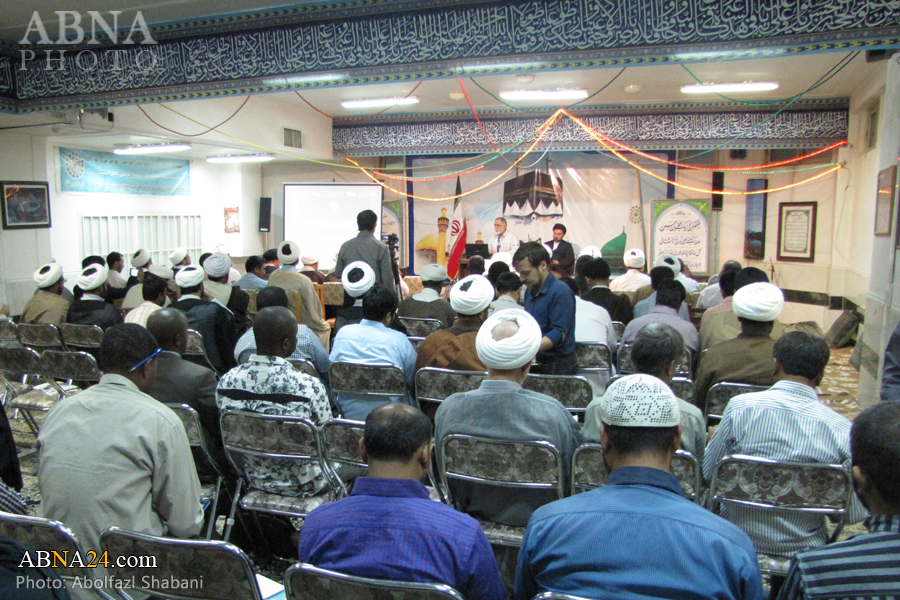According to Ahlul Bayt News Agency – ABNA – as the month of Muharram and the mournings for Imam Hussain's (A) martyrdom close in, the Ahlul Bayt World Assembly's session with cultural centers abroad was held, focusing on Cyberspace.
In this meeting which was held on Saturday, September 24th, in Qom, many managers and members of the Shiite Cultural Centers from different countries were present. " Hujjat al-Islam Imani Moqadam" Cultural Affairs Deputy of the Ahlul Bayt World Assembly and "Sayyed Mohammad Hasan Mirdamadi" advisor of the Ahlul Bayt World Assembly's secretary-general delivered speeches in the meeting.
Imani Moqadam: missionaries are the "Maytham al-Tammars" of our time
In the beginning, Cultural Affairs Deputy of the Ahlul Bayt World Assembly delivered a speech. Imani Moqadam pointed out at ""Maytham al-Tammar's" martyrdom anniversary and called the missionaries the Maytham al-Tammars of our time who introduce Ahul Bayt and Vilayat all over the world.
Pointing out at the 4th verse of the Ibrahim sura, he said: "language is not only the words people speak, but the culture, instruments and tools and by employing which propagation must be done.
Emphasizing that "not always Minbar is the best choice for propagation", he considered cyberspace important and said: "today, others control this space and even among the Shiite, the deviant ones are dominant"
"Today, there are millions of cellphones in use which are always online. If we fall short in using this technology, we will be ashamed before Imam Ja'far al-Sadiq". He added.
In the end, Imani Moqadam added: "considering the nearing of Muharam and the time for propagation activities by missionaries, we held this meeting to let missionaries get more familiar with the opportunities and the significance of this space"
Mirdamadi: The incapable are the most capable in cyberspace
Later, the advisor of the Ahlul Bayt World Assembly's secretary-general delivered a speech, pointing out at Imam Khamenei's words regarding cyberspace and said: "He expressed his dissatisfaction with the missionaries' unfamiliarity with new technology and their lack of in-depth understanding of cyberspace and said that cyberspace has both advantages and disadvantages and we must seize the opportunity and use its advantages to propagate Islamic teachings more widely".
He also pointed out at Grand Ayatollah Saafi Golpayegani's insistence on using cyberspace and social networks for propagation and said: "in these spaces different people with different purposes are active and are preaching their deviant ideology, we must try to purify the space and introduce Islam and Ahlul Bayt to everyone".
Answering to the question that "what field must we be active in in cyberspace?" he said: "in any field that you are familiar with whether it is poetry, photography, or writing. Put a religious picture in virtual groups, give a short speech, or make a short clip at home".
Stressing on “The incapable are the most capable in cyberspace” he said: “in order to be active in cyberspace one does not need to be a capable orator. Simply quote others. You do not need to be a professional. If you have anything to say, just say it. You will find your audience”.
Asking the question :”How should we propagate?” he said: “cover each others’ activities. Help each other to find the right audience by linking the pages and posts. Post on pages and groups which are the most popular”.
He considered “tagging” one of the most effective strategies in cyberspace and said: “anything from a narration, a story, a poem to pictures can be effective. If we all take nice pictures of Ashura and tag it, google will show it. Currently, when one searches “Ashura” it the results are only of Tatbir. We must change it”.
It is noteworthy that in this meeting 90 activists in Cultural Centers from Afghanistan, Bangladesh, Pakistan, Tajikistan, Turkey, Ivory Coast, Mali, Nigeria, India etc. Were present.
Hujjat al-Islam Hussayni Aref, director of IT, and Hujjat al-Islam Aal Ayub, head of research in Ahlul Bayt World Assembly, were also present in this meeting.

